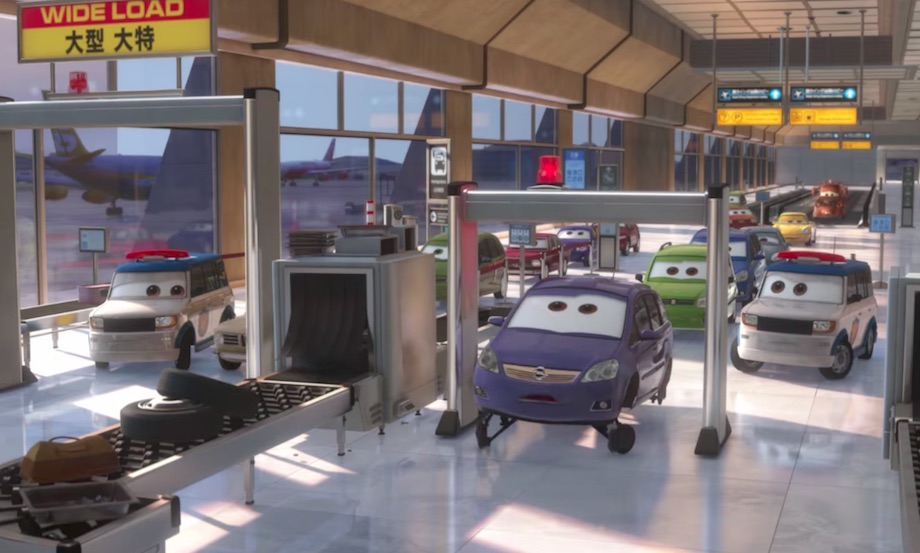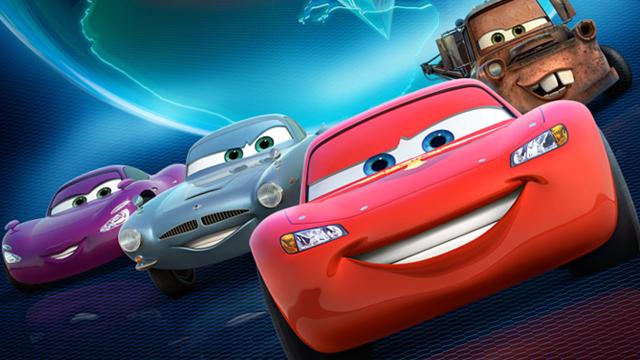Cars 2 was not a classic film. It was unfocused and a bit too dependent on plot rather than characters. But it was a solid film. It had great action set pieces and ‘blink and you’ll miss it’ humour. And it doesn’t deserve the death by omission it is currently enduring.
I watched Cars 3 on its debut weekend with my son. He’s two and a half; to him, the Cars franchise is manna from heaven. He loves it all: the TV shorts, the books, the clothes, the toys. He has an encyclopedia with the names and biographies of all the ancillary characters, and he pores over the expanded universe at any opportunity.
But the universe my son loves recently got a lot smaller. In Cars 3, Cars 2 never happened. There are no references, even in passing, to Holly Shiftwell, Finn McMissile, or the international World Grand Prix that was the backbone of Cars 2. The lone acknowledgement, if one could call it that, is that Lightning McQueen now had headlights instead of stickers, which Ramone installed in the prior film. If there wasn’t a ‘3’ on the end of the title, one could easily mistake Cars 3 for a first sequel, rather than the third part of a trilogy.

I’m not the only one who’s noticed this blatant omission, which is contrary to Pixar’s previous, multiple defences of Cars 2. In an interview with the New York Times in 2011, Cars 2 director and current head of Walt Disney Animation Studios John Lasseter responded to accusations that Cars 2 was a cynical cash grab. He said:
I don’t know what to say about that. Well, I guess I do. It’s not true. It’s people who don’t know the facts, rushing to judge. I recognise my place in the Walt Disney Company, but my job, my focus, my deepest desire is to entertain people by making great movies, and we did that with Cars 2.
Brook Barnes, who conducted the interview, noted that the critical response to the film had “dented morale” at the studio. Later, in the same interview, Lassetter insisted on the film’s personal importance:
I reached deep into myself and saw what this film was about, and I think it’s clear that audiences have responded. It’s is a very, very special film to me.
The Cars films have always been personal to Lassetter, whose interest in cars stated early; his father owned a Chevrolet dealership. But in his more recent statements, particularly in the run-up to Cars 3, he appears to distance himself from Cars 2. In a 2016 interview with Entertainment Weekly, he said:
Cars 3 is a very emotional story. It’s a little bit more akin to Cars 1, where you get into a deep emotion with [Lightning McQueen]. It’s really a special story.
This is a common sentiment that multiple people involved with the new film espoused — that Cars 3 gets back to “what Cars was about.”
That it goes back “to the roots of the franchise.” It sounds like massive dog-whistle for what they are all implying — that Cars 2 was a big mistake that Cars 3 corrects.
There is nothing, however, that needs to be corrected.
The original Cars‘ universe was small; it focused on NASCAR culture and the economic plight of small-town America. Cars 2 expanded that universe by creating a global community of cars. Because of the film’s overarching premise — Lightning is competing in the World Grand Prix — we got to see cars-inhabited versions of Japan, Italy, and England. The quality that many critics point to as a flaw — the film’s sprawl — is what makes it watchable. Its international scope allows for some of the best visual gags of the franchise, such as this shot of a Japanese car using a hubcap as a gong:

Or this shot of the Pope car in his Popemobile:

Or this shot of cars going through airport security by taking off their tires, rather than their shoes:

Thanks to my son, I’ve seen the first two Cars films numerous times, and I prefer rewatching the second one. There are little jokes and details in every frame. They get better with repeated viewings, and I catch new ones every time.
I like the film’s maligned spy subplot, a clever commentary on the conflict between newer alternative fuels and their fossil fuel predecessors. It manages to be both Cars-centric and relevant to the audience’s real world concerns. It’s a bit fantastical and tonally dissonant from the first film, but it’s intriguing, with a couple of cool twists and swerves before the final reveal.
The most vocal Cars 2 criticism has to be the emphasis — critics might say overemphasis — on Mater. In Cars 1, the rusty tow truck was a supporting player with punchlines. In Cars 2, Mater is the star and featured protagonist, and Lightning takes a backseat to his ‘aw shucks’ best friend.
While critics have been ambivalent about Mater’s simple-minded characterisation, he has more appeal than Lightning ever will. Even though Lightning is the star, he is the weak link of the franchise: he had no personality outside of his cockiness and arrogance. After he learned humility in Cars 1, there was nothing else to make him compelling. Even in Cars 3, Lightning still lacks a discernible personality; newcomer Cruz has to supply the charisma for the both of them.
Mater has an arc in Cars 2, which can be summed up by the value he places on his body’s “dents.” He refuses to get them fixed:
Mater: I don’t get them dents buffed, pulled, filled or painted by nobody. They way too valuable.
Holley: Your dents are valuable? Really?
Mater: I come by each one of ’em with my best friend, Lightning McQueen. I don’t fix these. I wanna remember these dents forever.
Mater is flawed. He makes a lot of mistakes. But those experiences are a part of him, and he doesn’t think they should be covered up or denied. There’s a cute irony throughout the film: during the entire time that Holly and Finn mistake Mater for a spy, he is actually a very good one. It isn’t because he pretends to be one. Rather, it’s because he acts like he normally would, using his knowledge and experience to draw correct inferences. There’s value in being oneself, dents and all. And Mater learns not to feel shame for this.
While Lightning doesn’t change as much as Mater, the film does take him in another direction rather than rehashing the plot from the first film. In Cars 1, he was a jet-setter who baulked at the provincial Radiator Springs.
Eventually, he came to appreciate the town’s slower pace and rustic authenticity. But Cars 2 inverts that conflict. Lightning may have appreciated his new friends’ small-town outlook, but to what extent did he actually view them as his equals? Would he be embarrassed to introduce them to his more worldly friends and bring his two worlds together? Could he accept, in a public sphere, this new, less-refined aspect of his identity?
Cars 2 asks these questions against a backdrop of explosions, spy shenanigans, and gunfights. This is the most violent Pixar film to date and features the on-screen murder of a car.
Cars 2 is, at its core, a big-budget action flick, with all the inherent flaws. But the deeper questions and meanings are there, albeit buried deeply.
And after this big, expansive, world-building sequel, we get Cars 3, which takes a more narrow scope than Cars 1. It’s a road story that zeroes in on two characters, Cruz and Lightning. The other cars in the movie have bit roles or one or two lines, if that. The filmmakers caught flack for shallow, mindless action in Cars 2. So for Cars 3, they overcorrected, with a deep character dive into Lightning, to the exclusion of everything else.
The problem, however, is that Lightning himself lacks the personal depth to sustain this sort of character study. It’s why Cars 3, for all the celebration over its return to roots, is curiously bland, in the same manner as Cars 1. Cars 2 has an energy and excitement that the two films bookending it lacked. Which is better? The film that sets its sights highly and doesn’t quite reach them, or the film that sets its sights lower, and reaches them comfortably?
Ultimately, Cars 2 is a victim of Pixar’s prior success; the studio, up to that point, had released critical hit after critical hit. It was was inevitable that the studio would miss eventually, and it happened when Pixar released this flawed, but not terrible film. At one time Pixar stood by a film that clearly took a lot of effort and creativity and was popular with audiences. Lasseter made a big show of stating “I don’t make films for film critics” back in 2011. Now, the change in public attitude is striking.
Even if the filmmakers think that Cars 2 was a misstep, they could certainly take a lesson from Mater. There’s no need to fix the dents. It’s the dents that make us who we are.

Comments
10 responses to “Cars 2 Does Not, In Fact, Suck”
Nah, Cars 2 sucks. Sorry.
Total agreement there. But, I still watch it now and then as I still think it’s enjoyable (to me). It was my one of my favourite films as a kid when it came out, so when I do watch it now it’s more for nostalgia and looking at the pretty scenes. But yeah, this film besides the animation is just garbage.
I like that they have Lightning meet cars voices by different nationalities’ drivers in the one scene dependent on the localisation, such as Vettel for Germany, Alonso for Spain, Winterbottom for Aus etc
I have a 5 year old boy and 3 year old boy and we have all seen both of these movies numerous times as well. The kids love both and I enjoy 2 as well, it just wasn’t the right direction for it I don’t think (apart from all the new toys!) There is one more tiny link back to Cars 2 though, Jeff Gordon shows up as Jeff Gorvette for a little cameo. Also, Lewis Hamilton is in both but as different characters so that doesn’t count I suppose.
It’s annoying that they try to claim that the Cars franchise isn’t a cash grab. What? It’s just a huge coincidence that they’re cash-printing merch machine while being the most critically panned Pixar movies?
I think the original Cars is fairly underappreciated. Neither of the sequels really came close to nailing what the first managed though.
I’d be inclined to agree that Cars 3 is curiously flat, due more, I think, to some weird structural and pacing issues than McQueen being too simple a character, though that’s not necessarily a bad point. Is it worse than Cars 2? Probably not, though I’d have to give it some consideration.
I once glimpse of the meaning of life displayed through a game of tic-tac-toe…
Agreed that Cars 1 is bland, even though it had a subdued wit, themes too nuanced and perhaps too sophisticated to fully exploit with silly-looking living cars in a movie more clearly targeted to kids than any other Pixar movie until then, so it rather felt flat for adult audiences. And yes, McQueen is a super boring character.
But Cars 2? Cars 2 is cheap in everything except its production values. The humour was mostly facile car-translations of real world places and cultural artefacts, that seemingly clever enough to pull a chuckle when you see it, in hindsight you realise they were simply obvious and almost automatic. The plot of [insert unlikely character] who due to ridiculous shenanigans that punch clean through whatever measure of disbelief you allowed yourself finds himself passing as a spy and then succeeds at it thanks to precisely those character quirks that make them “unlikely” is one of the oldest, most tired and most abused tropes in Hollywood’s burlesque house of narrative. Predictable as hell, jarring as hell, unbelievable as a thousand hells.
That said, I can see why kids love them. Part of the problem might also be that most Pixar movies, while kid-friendly are truly all-ages, layered and satisfactory even for the most discerning adults. however, there are a few movies that are more targeted at kids that get measured with the lot of them and of course, found lacking by the adult audiences. Both Cars, Brave, and The Good Dinosaur (and the second half of Up! if we’re honest) suffer from this and unsurprisingly, they are the lower rated Pixar movies. Maybe Pixar should create a Pixar Kids label for that type of movies to make the adult audiences more forgiving.
Cars 1 is absolutely targeted at adults. However it’s appeal is certainly niche and doesn’t offer as much of a broad offering as other Pixar films.
Cars was made by “Car people” and you’ve probably got to be another car person to fully appreciate what went into the film. It is absolutely nuanced and full of fantastic car history and references, as well as beautifully done satire.
Take the street racers, for example. They are a perfect caricature of that sort of culture [and gently take the piss of movies like the Fast and the Furious]. Even their names add to the fun; Wingo, DJ, Boost and Snot-Rod. Come on, is that not fun or what?
The casting is excellent. George Carlin [certainly NOT kid friendly! haha] as Filmore the Hippy VW bus? Paul Newman as Doc Hudson the Hudson Hornet? Cheech Marin as Ramone the lowrider Impala? How can you not love that? The history is also spot on, the Fabulous Hudson Hornet is legendary in stock car racing lore.
The setting is certainly on point as well. A sleepy town slowly dying after being bypassed by the interstate. It’s all relevant stuff.
The graphical effects in that movie were also hugely groundbreaking at release. Watch the scene with Doc Hudson drifting on the dirt track and watch with awe as the dust gets flung up into vortices behind. Just lovely.
Don’t get me wrong, I certainly appreciate that the biggest shared trait of adults watching pixar films is likely “parents of young kids”, so I can see why it isn’t received as favourably as, say, Toy Story. But for those who this movie is aimed at, it is simply a wonderful watch.
Good analysis, thanks. I wasn’t aware of all the car-people nuance, but I did say that I felt there was an undercurrent of sophistication. The reason why I said that nevertheless I felt that the movie had been marketed to kids was the character design plus the fact that the immediately cashed in with the line of toys.